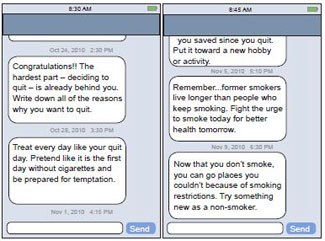NIH Office of Behavioral and Social Sciences Research (OBSSR) hails 20 years of fueling behavioral science
May / June 2015 | Volume 14, Issue 3
By Cathy Kristiansen
Humans can behave in irrational ways that undermine their health - for instance, starting a smoking habit, ignoring advice to exercise, or failing to take prescribed medicine. Changing negative behaviors can be very difficult. To encourage more research and interventions that predict, prevent and manage behavior and ultimately improve health, Congress in 1995 established the NIH
Office of Behavioral and Social Sciences Research (OBSSR), which is now
celebrating 20 years of accomplishments in the U.S. and globally.
"We strive to remain a catalyst for advances in behavioral and social sciences research and the dissemination of its findings and contributions," said Dr. William Riley, OBSSR Acting Director. Over the past decade alone, he observed, the Office has developed new behavioral and social science approaches, encouraged transdisciplinary exploration and embraced scientific developments.
In recent years, this field of science has blossomed, producing new evidence that in turn has spurred policies targeting healthy behaviors at the individual and societal levels. For instance, governments have introduced higher cigarette taxes to reduce smoking, funded giveaway programs to encourage condom use and expanded care services for mental health disorders.
More professionals are entering the field, as illustrated by a
USA TODAY poll that showed an 89 percent rise in U.S. behavioral science college graduates between 2008 and 2013.


Photos by David Rochkind for Fogarty
For over 20 years, OBSSR has driven research on how to
encourage healthy habits.
OBSSR, in NIH's Office of the Director, aims to deepen NIH understanding of behavioral and social sciences and enhance research outcomes. The Office does not issue grants itself, but uses its annual budget - currently about $27 million - to co-fund NIH Institute and Center projects on a wide range of crosscutting health topics. These include chronic disease management, treatment adherence, health communications, health information technology and mobile health (mHealth). A number of these collaborations have focused on low- and middle-income countries, where research data and capacity in behavioral and social science are very limited.
"OBSSR has been instrumental in raising awareness of the enormous impact of behavioral and social influences on overall health," said Fogarty Director Dr. Roger I. Glass. "Especially in global health, where researchers operate in different countries and cultures, it's important to incorporate these aspects of health when designing studies."
In one OBSSR-Fogarty partnership, researchers investigated how to improve pediatric and educational practices for Zambian children with reading disabilities. Although reading struggles occur everywhere in the world, children in developing countries have little access to early diagnosis and treatment, which are essential to minimize the daily burden and shorter lifespan associated with this disability type. The team developed culturally and linguistically appropriate interventions for a cohort of Zambian children and documented a strong relationship between high adaptive behavior and reading-related progress.
The health hazards of household air pollution, mostly caused by indoor cooking fires, are being studied in another ongoing OBSSR-Fogarty partnership. (Access a Fogarty collection of
Indoor Air Pollution and cookstove resources.) Scientists must consider the behavioral and social influences that have kept the community cooking the same way for thousands of years, to learn which cookstoves will be acceptable and used correctly - a busy mother might quickly abandon a new solar-powered device that cooks food too slowly for her needs, for instance.

Photo by David Snyder for Fogarty

OBSSR has led NIH efforts to study how text messages can
help change human behavior, for instance, to help people
stop smoking.
One way to potentially modify health behaviors is through mobile technology - smartphones and other electronic devices, which are increasingly used around the world, including in low-resource countries. Researchers are testing interventions using mHealth to remind patients to take their medications, attend a pending prenatal appointment or answer research questions in real-time for greater accuracy. OBSSR has been a leader at NIH in this behavior-influencing tool, convening workshops and maintaining an
mHealth website, among other steps. Although OBSSR has focused mainly on domestic research in this budding field, it has become a partner in Fogarty's new global mHealth initiative.
OBSSR has also rallied NIH interest in behavioral and social sciences via an NIH-wide network,
OppNet. Between 2010 and 2014, OppNet's member Institutes and Centers issued 160 grants on topics as diverse as sleep loss, successful aging, addiction and risky behavior patterns. OppNet has sponsored conferences, workshops, symposia and a website with videocasts to raise awareness and encourage collaborative research.
More understanding of how electronic screen use affects adolescent sleep-wake patterns is the topic of one multidisciplinary OppNet project, funded by OBSSR and the National Institute of Child and Human Development (NICHD). This is a growing issue, with teens around the world distracted by media and social network access and sleeping too little for optimal cognitive, emotional and physical development. The team based its study in Vietnam - a country that still has some villages without television and electricity - to allow comparisons between teens in different settings. The researchers predict their study will provide the first direct evidence of causal links between television and changes in adolescent sleep.
OBSSR also encourages the development of more expertise in this young field of science. "Our support of various training efforts prepares the next generation of behavior and social sciences researchers," Riley said. OBSSR contributes to capacity building by supporting research projects in low-resource countries that incorporate an element of training or by supporting tailored initiatives, such as Fogarty's Global Health Program for Fellows and Scholars. Awardees are funded for a year of mentored research training in a developing country under local mentorship. Over time, OBSSR-funded awardees have investigated topics such as suicidal risk factors among the elderly in India and undiagnosed psychiatric conditions in HIV-positive mothers in Kenya.
To shine light on research needs in unexplored fields, OBSSR has sponsored workshops, seminars and webinar talks by experts. It recently collaborated with NIH's National Institute of Minority Health and Health Disparities (NIMHD) to establish the "Aqui Lá" project, which assesses the situation of Brazilians and Dominicans living emotionally, socially and even physically between two nations, exploring how both transnational and local ecologies affect health behaviors and attitudes.
For the past 20 years, OBSSR has focused researcher attention on this burgeoning field, which plays such a large role in the success or failure of many interventions. "OBSSR has helped lead in the development and adoption of these new behavioral and social science approaches as they have unfolded, encouraging transdisciplinary exploration and embracing new scientific developments," Riley said. By harnessing the power of this science, he added, investigators can "transform biomedical research, clinical interventions and public health."
More Information
NIH behavioral and social sciences research resources and news:
-
Office of Behavioral and Social Sciences Research (OBSSR)
-
NIH Basic Behavioral and Social Science Opportunity Network (OppNet)
-
Qualitative Assessment of the NIH Behavioral and Social Sciences Research Portfolio - Interviews with Institute Staff and Personnel from Selected Professional Societies [PDF, <1M, 133 pages]
Kulinowski, K.M., Lee, G.C., and Nek, R., August, 2013 -
A new era for basic behavioral research at NIH
Association for Psychological Science
Observer, November 2009 -
Testimony of the Coalition for the Advancement of Health Through Behavioral and Social Science Research (CAHT-BSSR)
on behalf of the NIH and the CDC, April 11, 2000
More behavioral and social sciences research news and resources:
Related research publications:
To view Adobe PDF files,
download current, free accessible plug-ins from Adobe's website.